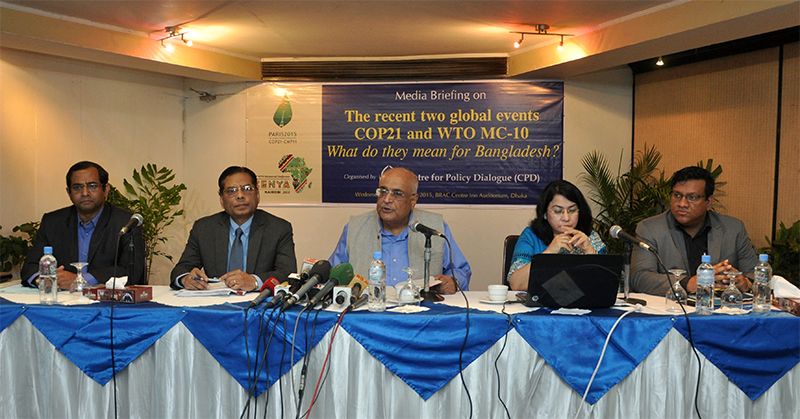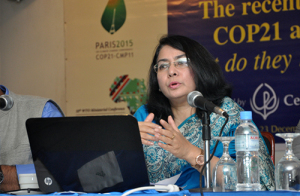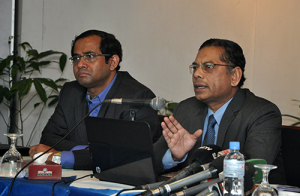
Interest and concerns of least developed countries (LDCs) were not adequately addressed in the context of the two recent global events: COP21, held on 30 November to 11 December 2015, in Paris, France and the 10th World Trade Organisation Ministerial Conference (WTO MC-10), held on 15-18 December, 2015 in Nairobi, Kenya. In view of this, Bangladesh will need to devise appropriate strategies and strengthen its institutional and negotiating capacities to advance her interests and secure the deliverables.
The observations emerged from a media briefing held at BRAC Centre Inn on Wednesday 23 December 2015 to present CPD’s views on the implications of the two major global events for Bangladesh and what the country should do in view of the comes.
Following opening remarks from Dr Debapriya Bhattacharya, Distinguished Fellow, CPD, two separate keynote presentations were made by the CPD Research Director Dr Fahmida Khatun and CPD Executive Director Professor Mustafizur Rahman on the COP21 and WTO MC-10 respectively.
 The Paris agreement was concluded in a balanced manner, only politically, but not morally. The outcome failed to reflect climate justice. It also did not fully address the ‘polluter pay principle’. The Agreement also made no mention of specific measures for Parties to decarbonise their respective economies. Indeed, the issue of “Carbon Tax” went entirely missing. The number of people displaced by adverse effects of climate change is increasing every day, but the Agreement did not mention the issue of “Climate Refugees”. The countries that signed the Agreement pledged to “reach global peaking of greenhouse gas emissions as soon as possible,” but the text doesn’t mention a specific date. Although the Agreement, for the first time, recognised the concept of “loss and damage”, adaptation, and loss and damage, were left in murky waters. The Decision (Paragraph 52) made it clear that developed countries will not accept liability for climate compensation. As a result, it is not clear whether Bangladesh will have access to the proposed climate fund will be provided to Bangladesh as a ‘grant’ or ‘loan’.
The Paris agreement was concluded in a balanced manner, only politically, but not morally. The outcome failed to reflect climate justice. It also did not fully address the ‘polluter pay principle’. The Agreement also made no mention of specific measures for Parties to decarbonise their respective economies. Indeed, the issue of “Carbon Tax” went entirely missing. The number of people displaced by adverse effects of climate change is increasing every day, but the Agreement did not mention the issue of “Climate Refugees”. The countries that signed the Agreement pledged to “reach global peaking of greenhouse gas emissions as soon as possible,” but the text doesn’t mention a specific date. Although the Agreement, for the first time, recognised the concept of “loss and damage”, adaptation, and loss and damage, were left in murky waters. The Decision (Paragraph 52) made it clear that developed countries will not accept liability for climate compensation. As a result, it is not clear whether Bangladesh will have access to the proposed climate fund will be provided to Bangladesh as a ‘grant’ or ‘loan’.
Dr Khatun observed that the Paris Agreement confirmed the need for Bangladesh to take actions to adapt to keep lives and livelihoods safe and secure in view of the changing climate, and to adopt a low-emission economy to continue growing as a prosperous country. In connection with this, Bangladesh has to invest in Green technology to graduate to a Green Economy path.
In his presentation on the outcomes of the WTO MC-10, Professor Rahman observed that the Ministerial failed to make any tangible progress from what was negotiated in Geneva by trade officials of the Member countries. Professor Rahman also highlighted that modality of discussion at the WTO MC-10 was not transparent and inclusive. EU, USA, India, China and Brazil dominated the negotiations, and particularly EU and USA dominated the discussions. The decision on preferential rules of origin for the LDCs was a positive achievement for the LDCs, he observed. In contrast, he, however, regretted that there was no meaningful progress as regards operationalisation of the services waiver particularly with respect to implementation of the preferential market access through flexible administrative procedures, visa-free regime, and easier rules for commercial presence, degree equivalence, recognition of accreditation certification etc.
Presentation on the report
1. Reflections on COP21: Bangladesh Perspective – Dr. Fahmida Khatun
2. WTO MC-10 Outcomes Reflections from Bangladesh Perspective – Mustafizur Rahman
Press Reports on the event
TV News clips on the event
 Professor Rahman urged Bangladesh to continue pushing for meaningful market access under the Hong Kong decision as regards DF-QF market access for LDCs. In this regard he pointed out that it was possible to narrow down the divergences in the positions of African and Asia-Pacific LDCs through further studies and cumulations. He noted that it was possible to identify a set of products where DF-QF market access, if given to Asia-Pacific LDCs, would not harm interests of African LDCs.
Professor Rahman urged Bangladesh to continue pushing for meaningful market access under the Hong Kong decision as regards DF-QF market access for LDCs. In this regard he pointed out that it was possible to narrow down the divergences in the positions of African and Asia-Pacific LDCs through further studies and cumulations. He noted that it was possible to identify a set of products where DF-QF market access, if given to Asia-Pacific LDCs, would not harm interests of African LDCs.
The MC-10 Ministerial Declaration expressed commitment of Members to advance negotiations on the remaining Doha issues. However, the Nairobi Ministerial Declaration also revealed major differences as regards approaches as to how to address the Doha Agenda. In all possibility there will be important systemic change in the way WTO negotiations take place in future, Professor Rahman observed. He also felt that pledges are not enough as regards aid for trade as there was no mention of financial needs of the LDCs in view of diagnostic trade integration studies and the significant support that will needed to implement TFA. Bangladesh will also need to be actively engaged in negotiations to operationalize the Services Waiver decision particularly with respect to modalities concerning preferential access in services market. To address the systemic changes in the WTO, Bangladesh will need to examine implications of the various approaches to negotiations including multilateralisation of Plurilaterals with embedded S&D provisions. Professor Rahman emphasized that Bangladesh will need to be engaged closely in these negotiations, especially being the Coordinator of the LDC group in the WTO.
Following the two presentations, Dr Bhattacharya shared his views on the two subjects dealt with during the media briefing. He emphasized that there is a transitional phase in the global negotiation process and global institutional order. He stressed that taking this into cognizance, Bangladesh will need to look beyond multilateralism and seek to utilize opportunities of other parallel processes. Research and knowledge-based policymaking will gain increasing prominence in this backdrop. There will need to be coordinated effort among the various government agencies which are involved in negotiations and also in implementation. Structural and institutional reforms will need to be made to address the attendant tasks. These actions should be in line with national development agendas and plans. Finally, Bangladesh will need to show strong leadership as the leader of the LDC group.
The presentations and deliberations were followed by a Q&A session with the journalists.

